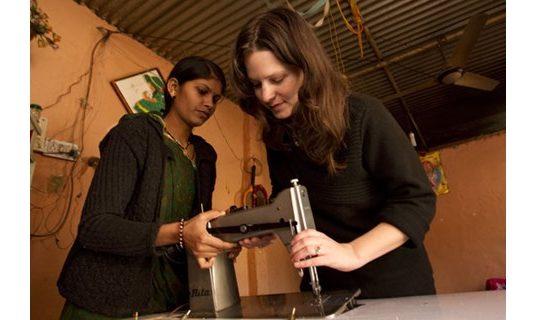
Rotary International reports on Jhoole, an Indian social enterprise that helps women weavers internationally market their hand-woven goods. The organization offers the women training and materials and helps connect them with designers and distributors. Jhoole is a non-profit organization based in Madhya Pradesh.
While a 2005-06 Rotary Foundation Ambassadorial Scholar in India, Hannah Warren gave a child laborer money to buy a dress. She remembers wishing she could have done more to help the girl.
During her scholarship, which was sponsored by the Rotary Club of Loves Park, Illinois, USA, Warren learned to speak Hindi and tutored illiterate women.
In 2008, Warren returned to India to photograph sari weavers in Maheshwar, Madhya Pradesh, part of a project funded by the Royal Society for Asian Affairs. She had planned to shoot portraits of the women wearing their hand-woven garments, but none of them could afford to own the exquisite saris they wove for others or even to buy the raw materials. So instead, Warren gave the women funds to purchase materials to make their own saris. In their portraits, she says, the weavers “looked so beautiful and proud” wearing the first saris they had designed for themselves.
The experience motivated Warren to found Jhoole, a fair-trade social entrepreneurship. The enterprise, based in Maheshwar, provides impoverished women with training, materials, and an international market for hand-woven goods so they can earn a living wage.
In 2010, a US$12,500 Rotary Foundation Matching Grant provided Jhoole with looms and other equipment, 1,500 pounds of cloth and thread, and funds to cover office expenses, publicity, and website design. It also covered the cost of training in weaving, sewing, and personal finance from the Indore School of Social Work. The grant was supported by the Loves Park club and four others in District 6420, including a $7,500 contribution from the District Designated Fund. The Rotary Club of Khargone in District 3040 also provided funding.
“With Hannah as a catalyst, we were given the opportunity to improve the lives of women and children in an area of the world our members may never visit,” says Past District 6420 Governor Anita Papich.
District 3040 Governor Nalini Langer says that Warren “is making commendable endeavours to empower women weavers and keep the art of Maheshwari handlooms alive.”
Using recycled material
By cultivating partnerships with designers and distributors, including Chicago-based Mata Traders, Warren has created a direct market for dresses, skirts, and handbags. The weavers frequently produce items from recycled materials, such as scarves made of scraps of fabric donated by Pratibha Syntex.
Jhoole gives 20 percent of its profits to Chetanya Sewa Sansthan, which aids elderly women and people with disabilities. Warren estimates that more than 300 people have benefited from both organizations’ programs.
In addition to the grant, Jhoole has received support from the Rotary Club of Maheshwar and others, which has helped fund two Jhoole fashion shows. The club is also donating $2,000 and land for another training facility in nearby Manpur.
“Because of its humanitarian aid and helping to eradicate poverty, Jhoole’s project has created a great impact,” says Alok Joshi, a Maheshwar club member.
“There is no way I could be doing this [work] were it not for my Ambassadorial Scholarship,” Warren says. “Like Jhoole’s programs, Rotary scholarships are not a one-time donation; they are an investment in goodwill.”
http://www.rotary.org/en/MediaAndNews/News/Pages/110214_news_warren.aspx
http://www.jhoole.org/
